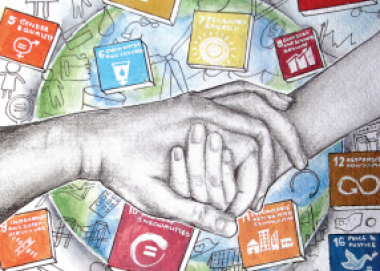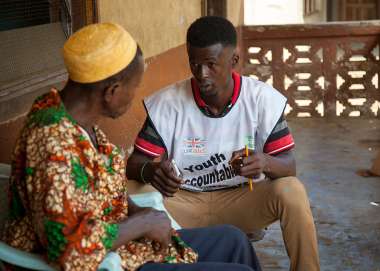Three female MPs from Sierra Leone arrived in Dublin in September to describe the barriers to women’s participation in politics and how Christian Aid-funded work on gender justice helped them get elected.
Hon. Rebecca Yei Kamara, Hon. Emelia Lolloh Tongi and Hon. Bernadette Wuyatta Songa were in Dublin to attend the International Congress of Parliamentary Women's Caucuses, addressed by Irish Taoiseach Leo Varadkar TD and former Acting Leader of the British Labour Party, Harriet Harman MP.
Forty-two countries were represented at the Congress by almost 200 female parliamentarians.
Rebecca, Emelia and Bernadette were elected to their national parliament on 7 March, 2018.
The three women credit their success to the support they received from two Christian Aid-funded projects supported by Irish Aid and the Hamilton family in the UK through Christian Aid’s innovation fund ‘In Their Lifetime'.
Christian Aid worked through its local partners, SEND (Social Enterprise Development) and NMJD (Network Movement for Justice and Development) on the ‘Power to Women’ and the ‘Women in Governance’ projects in Kono and Kailahun districts respectively, to ensure that there are more female voices in politics.
The projects enable women to gain leadership experience and the opportunity to engage with political parties and traditional leaders to promote the nomination and election of female candidates.
Christian Aid believes that at the root of poverty lies the unequal distribution of power and, in order to effectively tackle poverty, it is essential to challenge gender inequality.
Low representation of women in politics leads to women being marginalised and denied a voice.
In Sierra Leone, the traditional patriarchal culture means that women’s voices are not often heard in their communities.
Rebecca Yei Kamara
Rebecca was one of those who benefited, winning almost half the vote share.
She made history becoming the first woman to represent her constituency in the national parliament.
Rebecca received training from NMJD’s ‘Power to Women’ project on leadership, self-confidence and public speaking. But she has been involved with NMJD for many years.
In 2015, NMJD set up the Women’s Network and, as chair for her district, Rebecca lobbied men, including the traditional leaders, to develop bye-laws prohibiting violence against women and girls.
NMJD made Rebecca their ‘Woman of the Year’ in recognition of her work. Speaking just after a Christian Aid and Trócaire seminar on Women in Politics at Trinity College Dublin, Rebecca explained that the award had enabled her to expand her work into schools.
“With the award I was able to visit ‘Gender Clubs’ in schools and engage with young girls about sexual harassment,” she said.
NMJD operates a referral service for survivors of gender-based violence (GBV), also funded by Christian Aid, which encourages women and girls to report their experience, supporting them through the judicial process.
Physical violence and sexual abuse of women and girls used to go unreported but NMJD is bringing it out of the shadows.
“Our sensitisation work is leading women and girls to acknowledge and confront the problem of GBV,” Rebecca said.
It was this work on GBV that led Rebecca to enter politics. And it’s clear that she intends to use her recent election as a platform on which to grow her grassroots movement:
“Although my party is not in government, I believe that it’s important to work with other women in the communities who will be able to talk to people, to men, to see how they can control these sexual offences," she said.
“Even if the laws are passed, unless the practice is challenged at community level, those laws will be useless.”
Bernadette Wuyatta Songa
Also attending the Congress in Dublin was Bernadette Wuyatta Songa.
Bernadette started life in Sierra Leone but at the age of 18, she fled the war to settle in London. Over the course of the next eighteen years, she married, had three children and established a career as a psychiatric nurse. For most people, the story would end there. But Bernadette heard the call of her people.
On visits home to Sierra Leone, she was moved by the plight of women in her country whom she describes as ‘hugely oppressed’.
Speaking on the last of a four-day visit to Ireland, she said: “What really touched me was that women felt very intimidated in my constituency because they can never lead."
In October 2017, Bernadette quit her nursing job to work on women’s emancipation and nation-building.
In March 2018 when she was elected as MP for Kailahun District, becoming the first woman since independence to represent her constituency in Parliament.
“After completing the campaign, I was then imposed with a clause from my constitution that MPs cannot have a dual citizenship," she said.
"So, I came back to the UK and renounced my British citizenship and only then was I allowed to contest.”
However, Bernadette said the hope she sees in the faces of her constituents brings its own reward.
"It has gone down in history as the first election of a woman in my constituency," she said.
“It means so much to see my people, the women, being very bold, knowing that their self-esteem is coming up, giving them hope that other young people can come up and do the same thing.”
Emelia Lolloh Tongi
Emelia was born and raised in Sierra Leone but spent many years in France working at the Sierra Leone Embassy and later with an international bank.
While in Europe, she paid regular visits to her hometown Beudu where the hardships of her people motivated her to return home and work for change.
Two years ago, Emelia joined the Kailahun ‘Women in Governance Network’ run by Christian Aid’s partner SEND.
There, she received training in gender, leadership, advocacy and political intelligence which enabled her to challenge culture and traditions that disempower women, and those who promote them.
Ahead of the elections in March 2018, Emelia campaigned using the Women on the Move radio programme, sharing her manifesto with the public and building support for her policies.
During the first of these appearances, she realised there was a huge appetite for change and her popularity grew.
Despite being an independent, her candidacy was endorsed by paramount chiefs and section chiefs, as well as women, the elderly and young people.
But Emelia faced many challenges especially from the incumbent MP Sahr Fatorma. He used the secret societies to try to persuade people not to vote for a woman, saying that a woman has nothing to offer.
She was intimidated, her house burnt down, properties destroyed and there were even death threats. But she was undeterred.
“I was born and raised by parents who told me that nothing is impossible if you really want to achieve it. I am determined to ensure that I make a change in my constituency,” she said.
Of the three MPs, Emelia was the only one who faced the particular challenge of fighting the election as an independent.
But she wasn’t alone because she had the support of SEND.
Speaking in front of the Irish Parliament building, she thanked SEND for their support.
“SEND has been so great, I want to thank them. SEND was there when I was panicking,” Emelia said.
“Joseph [a SEND staff member] would call me early in the morning and tell me ‘get up, go house to house, knock their doors, talk to them and convince them’ and indeed I did all these things, I followed their advice and it worked. He was always there.
“SEND said, ‘we will support you. We know your potential. We believe in you.’ And this is how I got to win this election, with the help of SEND and I will always be grateful to them.”
Find out more about our work on gender, power and inclusion and in Sierra Leone



